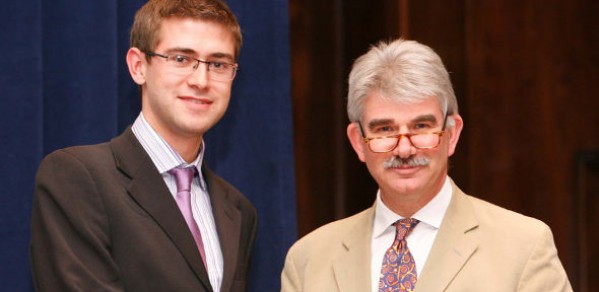
Andrew beat off competition to win the UK final of the Institution of Civil Engineers (ICE) 2008 Graduate and Student Papers Competition. In March he won £250 for coming top in the regional heat.
I am delighted to have won because the standard of entries was extremely high this year and it is an honour to have been chosen by the judges. I will certainly encourage others to enter in future.
Andrew Jackson, winning PhD student
He presented his paper 'Pile jacking in sand and silt' to a panel of senior civil engineers and an audience of students and graduates in London. The paper explores the problems associated with traditional pile-jacking and was the result of a collaboration between the Department's geotechnical group and Giken a Japanese piling company.
Pile jacking is a relatively new process for pushing foundation piles into the ground. Benefits over alternative methods include reduced noise and vibration during installation and improved performance of the pile in use. A pile jacking machine can be used to grip previously installed piles and use hydraulic rams to press (or ‘jack’) a new pile into the ground. This project aimed to improve understanding of the behaviour of the piles during jacking. This understanding can then help the designers and operators of the pile jacking machinery in specifying and controlling the machines. It can also assist engineers in checking that the piles will continue to be able to support the weight of the building above. All the findings then assist engineers in ensuring that the piles can continue to support the weight of the building above. As part of the ongoing Department of Engineering/Giken collaboration Andrew spent a total of two months in Kochi in Japan, working with Japanese engineers and other Cambridge students to install and test full-size piles on site.
Said Andrew: "I am delighted to have won because the standard of entries was extremely high this year and it is an honour to have been chosen by the judges. I will certainly encourage others to enter in future."
In addition to the prize money Andrew also receives his choice of three days of professional training courses, £150 of civil engineering book vouchers and a commemorative medal.
Presenting the prize ICE Director General Tom Foulkes said: "I congratulate Andrew and indeed all the finalists for the innovative content of their work and for delivering such impressive performances."

